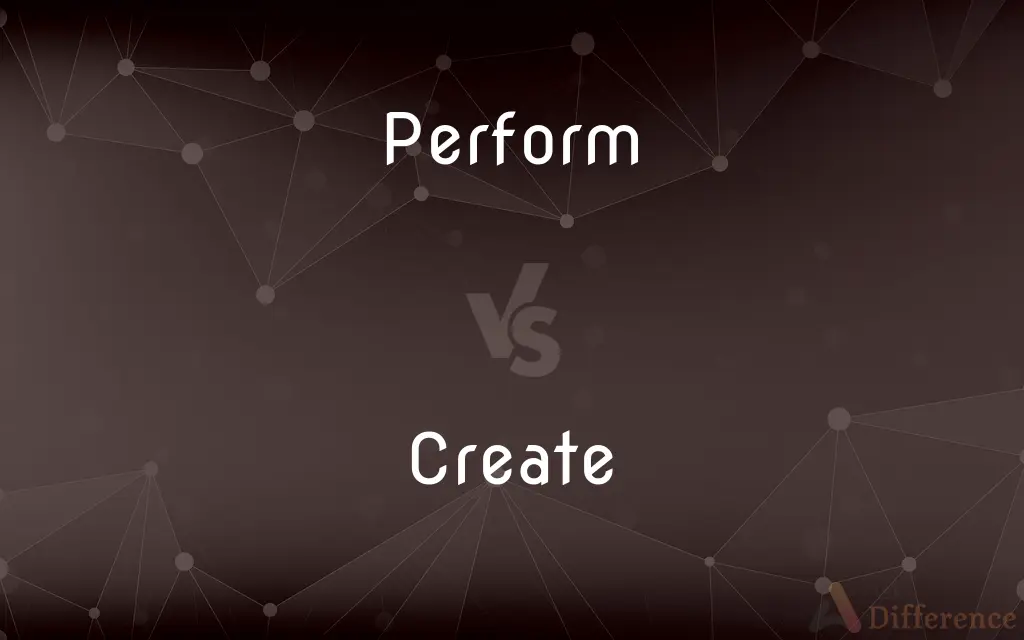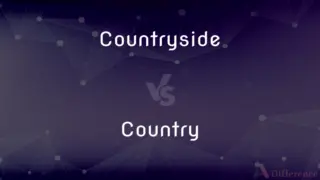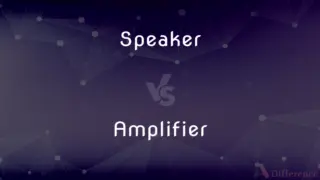Perform vs. Create — What's the Difference?
By Tayyaba Rehman & Maham Liaqat — Updated on April 8, 2024
Performing involves executing an action or presenting art, often live, while creating involves bringing something new into existence, such as art, ideas, or products.

Difference Between Perform and Create
Table of Contents
ADVERTISEMENT
Key Differences
Performing is the act of executing a set of actions or presenting artistic work in front of an audience, emphasizing skills such as acting, singing, or dancing. It requires a performer to interpret and deliver existing work, even if improvised, to convey emotions, stories, or expressions through their art. Creating, on the other hand, is the process of conceiving and developing new ideas, objects, or expressions. It encompasses a wide range of activities from painting and writing to inventing and designing, focusing on the genesis of new concepts or tangible works from one's imagination or inspiration.
Performance art often involves live presentation and real-time interaction with an audience, allowing immediate feedback and a unique, ephemeral experience. Creation, while it can be shared and appreciated by others, does not necessarily involve direct interaction during the creative process. The creator may work in solitude, developing their piece over time, with the audience engaging with the work at a different stage.
In performing, the emphasis is on the execution and interpretation of material, whether it’s a musical composition, a play, or a dance choreography. Performers bring life to existing works, adding their personal touch and interpretation. In creating, the focus is on the original development of the material itself. Creators are the originators of content, whether it be stories, music, art, or inventions, bringing something new into the world.
While both performing and creating can be deeply personal and expressive, performing is an act of sharing and expression through the medium of one's presence and skill, often in real-time. Creating is an act of innovation and invention, producing new works that may later be performed, displayed, used, or observed, independent of the creator's direct involvement at the moment of engagement.
The relationship between performance and creation is symbiotic. Performers often rely on creators to provide the material they bring to life, while creators may see their work reach greater heights through the interpretation and talent of performers. Both are essential to the cultural and artistic landscape, offering different but interconnected ways of experiencing and contributing to the arts.
ADVERTISEMENT
Comparison Chart
Definition
To execute an action or present art
To bring something new into existence
Focus
Execution and interpretation
Innovation and origination
Interaction
Live and with an audience
Often solitary, with later audience engagement
Emphasis
Skill in delivery and interpretation
Originality and invention
Example Activities
Acting, singing, dancing
Painting, writing, inventing
Outcome
Live presentation, real-time feedback
New concepts, works, or products
Role
Interpreter and presenter of works
Originator of new content or objects
Medium
Requires presence or performance medium
Any medium, from physical to digital
Compare with Definitions
Perform
Delivery of an existing piece with personal interpretation.
His ability to perform classical pieces is renowned.
Create
To originate new ideas or works.
He creates captivating sculptures from recycled materials.
Perform
To execute a presentation or work of art.
She will perform the lead role in tonight's play.
Create
Act of artistic production.
The artist creates with a mix of traditional and digital mediums.
Perform
Act of live artistic expression.
The musician performs with unmatched passion.
Create
Development of original content.
They create music that blends genres seamlessly.
Perform
Skillful presentation of material.
The dancer performs with grace and precision.
Create
Process of invention or design.
She creates innovative software solutions.
Perform
Real-time engagement with an audience.
Performing live gives her an incredible energy.
Create
Bringing something into existence through imagination.
Authors create worlds with their words.
Perform
Carry out, accomplish, or fulfil (an action, task, or function)
I have my duties to perform
Create
Bring (something) into existence
He created a thirty-acre lake
Over 170 jobs were created
Perform
Present (a form of entertainment) to an audience
The play has already been performed in Britain
Create
Make a fuss; complain
Little kids create because they hate being ignored
Perform
To begin and carry through to completion; do
The surgeon performed the operation.
Create
To cause to exist; bring into being
Created a new music school.
Perform
To take action in accordance with the requirements of; fulfill
Perform one's contractual obligations.
Create
To give rise to; produce
That remark created a stir.
Perform
To enact (a feat or role) before an audience.
Create
To produce through artistic or imaginative effort
Create a poem.
Create a dramatic role.
Perform
To give a public presentation of; present
My theater group performed a three-act play.
Create
To invest with an office or title; appoint
He was created a baron.
Perform
To function or accomplish something as expected or required
A car that performs well on curves.
Workers not performing up to standard.
Create
Created.
Perform
To yield a return on investment
Stocks that performed well.
Create
(transitive) To bring into existence; (sometimes in particular:)
You can create the color orange by mixing yellow and red.
Perform
To portray a role or demonstrate a skill before an audience
The juggler performed atop a unicycle.
Create
To bring into existence out of nothing, without the prior existence of the materials or elements used.
Perform
To present a dramatic or musical work or other entertainment before an audience.
Create
To make or produce from other (e.g. raw, unrefined or scattered) materials or combinable elements or ideas; to design or invest with a new form, shape, function, etc.
Couturiers create exclusive garments for an affluent clientele.
Perform
(transitive) To do (something); to execute.
The scientists performed several experiments.
It took him only twenty minutes to perform the task.
Create
(transitive) To cause, to bring (a non-object) about by an action, behavior, or event, to occasion.
Crop failures created food shortages and high prices; his stubbornness created many difficulties
A sudden chemical spill on the highway created a chain‐collision which created a record traffic jam.
Perform
(intransitive) To exhibit an expected pattern of behavior; to function; to work.
The new employee performs well.
Create
(transitive) To confer or invest with a rank or title of nobility, to appoint, ordain or constitute.
Henry VIII created him a Duke.
Last month, the queen created two barons.
Under the concordate with Belgium, at least one Belgian clergyman must be created cardinal; by tradition, every archbishop of Mechelen is thus created a cardinal.
Perform
(law) To act in a way set forth in a contract.
Create
(intransitive) To be or do something creative, imaginative, originative.
Children usually enjoy creating, never mind if it is of any use!
Perform
(transitive) To act in accordance with (a contract); to fulfill one’s terms of (a contract).
Failure to perform a contract on time may constitute a breach of contract.
Create
(transitive) In theatre, to be the first performer of a role; to originate a character.
Perform
(intransitive) To fulfill contractually agreed-to terms.
They entered into an agreement and now they are obliged to perform.
Create
To make a fuss, complain; to shout.
Perform
(ambitransitive) To do (something) in front of an audience, such as acting or music, often in order to entertain.
She will perform in the play.
The magician performed badly—none of his tricks worked.
The string quartet performed three pieces by Haydn.
Create
(obsolete) Created, resulting from creation.
Perform
To behave theatrically so as to give the impression of (a quality, character trait, etc.); to feign.
The accused only performed remorse.
Create
Created; composed; begotten.
Hearts create of duty and zeal.
Perform
(social science) Of a social actor, to behave in certain ways.
Create
To bring into being; to form out of nothing; to cause to exist.
In the beginning, God created the heaven and the earth.
Perform
(transitive) To behave in accordance with, and thereby in turn shape, (a social notion or role).
Perform masculinity
Perform authority
Create
To effect by the agency, and under the laws, of causation; to be the occasion of; to cause; to produce; to form or fashion; to renew.
Your eye in ScotlandWould create soldiers.
Create in me a clean heart.
Perform
(intransitive) To behave in ways that carry meaning in social contexts.
Individuals in societies perform all the time.
Create
To invest with a new form, office, or character; to constitute; to appoint; to make; as, to create one a peer.
Perform
To carry through; to bring to completion; to achieve; to accomplish; to execute; to do.
I will cry unto God most high, unto God that performeth all things for me.
Great force to perform what they did attempt.
Create
Make or cause to be or to become;
Make a mess in one's office
Create a furor
Perform
To discharge; to fulfill; to act up to; as, to perform a duty; to perform a promise or a vow.
To perform your father's will.
Create
Bring into existence;
The company was created 25 years ago
He created a new movement in painting
Perform
To represent; to act; to play; as in drama.
Perform a part thou hast not done before.
Create
Pursue a creative activity; be engaged in a creative activity;
Don't disturb him--he is creating
Perform
To do, execute, or accomplish something; to acquit one's self in any business; esp., to represent sometimes by action; to act a part; to play on a musical instrument; as, the players perform poorly; the musician performs on the organ.
Create
Invest with a new title, office, or rank;
Create one a peer
Perform
Carry out or perform an action;
John did the painting, the weeding, and he cleaned out the gutters
The skater executed a triple pirouette
She did a little dance
Create
Create by artistic means;
Create a poem
Schoenberg created twelve-tone music
Picasso created Cubism
Auden made verses
Perform
Perform a function;
Who will perform the wedding?
Create
Create or manufacture a man-made product;
We produce more cars than we can sell
The company has been making toys for two centuries
Perform
Give a performance (of something);
Horowitz is performing at Carnegie Hall tonight
We performed a popular Gilbert and Sullivan opera
Perform
Get (something) done;
I did my job
Common Curiosities
What does it mean to perform?
To perform means to execute or present a piece of work, often artistically, in front of an audience.
How do performing and creating differ in terms of audience interaction?
Performing involves direct, often live, interaction with an audience, while creating may not involve immediate audience engagement, focusing on the production of new content or objects.
How does the outcome of performing differ from creating?
The outcome of performing is the live presentation and interpretation of work, while creating results in the generation of new ideas, works, or products.
How important is audience feedback in performing and creating?
Audience feedback is crucial in performing for immediate adjustments and understanding impact, while in creating, it can guide future revisions and projects.
What mediums can creation encompass?
Creation can encompass any medium, ranging from physical to digital, including visual arts, literature, music, and technological inventions.
What motivates someone to create?
Motivation to create can come from a desire to express oneself, to innovate, to tell new stories, or to solve problems in novel ways.
What is involved in creating something?
Creating involves conceiving and producing something new, whether it be an idea, an artistic work, or a product.
Can someone perform and create at the same time?
Yes, someone can both perform and create, as in improvisational arts where the creation and performance occur simultaneously.
What role does innovation play in creating?
Innovation is central to creating, as it involves developing new concepts, designs, or methods not previously seen.
Can the act of performing influence the creation of new works?
Yes, the act of performing can inspire the creation of new works, as feedback and experiences garnered from live presentation can influence future artistic endeavors.
Is performing an artistic endeavor?
Performing is primarily an artistic endeavor, focusing on the skilled interpretation and presentation of artistic works.
How do performers contribute to the arts?
Performers contribute to the arts by bringing works to life through their skill, interpretation, and engagement with audiences, enhancing the appreciation and understanding of artistic endeavors.
What distinguishes a creator in the arts?
A creator in the arts is distinguished by their ability to produce original content or works, contributing new perspectives, stories, and experiences to the cultural landscape.
What skills are important for performers?
Important skills for performers include mastery of their art form, interpretative skills, and the ability to engage and communicate with an audience.
How do social and cultural contexts influence performing and creating?
Social and cultural contexts significantly influence both performing and creating by shaping the themes, methods, and reception of artistic endeavors, reflecting and challenging societal norms and values.
Share Your Discovery

Previous Comparison
Countryside vs. Country
Next Comparison
Speaker vs. AmplifierAuthor Spotlight
Written by
Tayyaba RehmanTayyaba Rehman is a distinguished writer, currently serving as a primary contributor to askdifference.com. As a researcher in semantics and etymology, Tayyaba's passion for the complexity of languages and their distinctions has found a perfect home on the platform. Tayyaba delves into the intricacies of language, distinguishing between commonly confused words and phrases, thereby providing clarity for readers worldwide.
Co-written by
Maham Liaqat












































